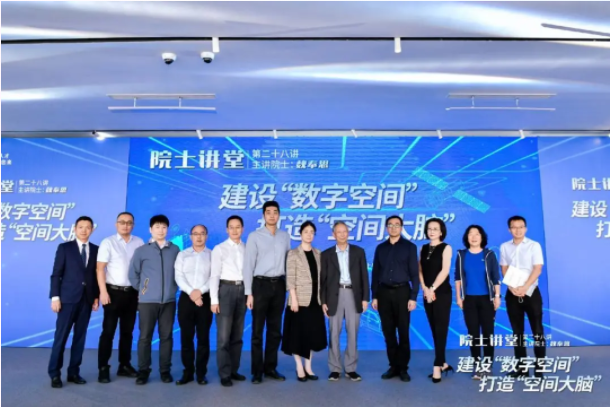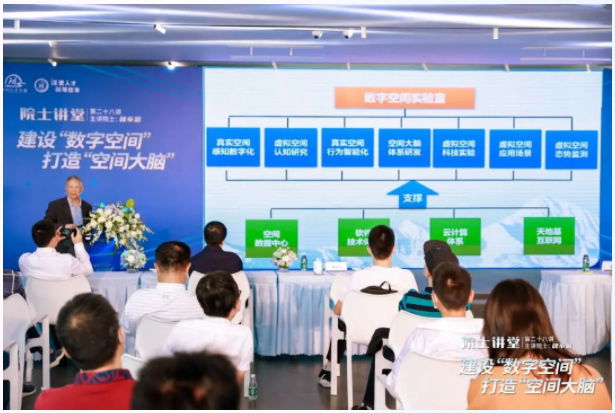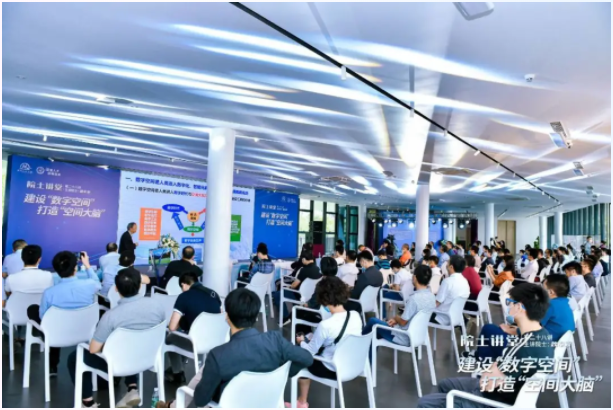To Build the "Heavy Weapon" of China, Academician Wei Fengsi Hopes to Build "Digital Space" in Shenzhen
Digital space is a new concept, new project and new industry first put forward by Chinese scientists. On the morning of the 24th, at Qiuxian Pavilion in Shenzhen Talent Park, Wei Fengsi, academician of the Chinese Academy of Sciences, delivered a keynote speech on Building Digital Space and Creating Space Brain at the 28th Academician Hall, sharing the above views that make Chinese scientists proud. At the lecture, he introduced to the audience the concept of digital space and its related research and application, and pointed out that China's construction of "digital space" in the sky field is expected to become an important tool of the country, helping China to achieve corner overtaking in high-end frontier fields.
Lian Cong, deputy mayor of Nanshan District, Liu Shiming, director of Nanshan District Science and Technology Innovation Bureau, Xu Zhe, director of Nanshan District Talent work Bureau, and more than 150 people came to listen, including representatives of district organs directly under the district, district high-level talent representatives, provincial and municipal innovation and entrepreneurship teams, and representatives of related enterprises and citizens.

Academician Wei is the dean of the Institute of Space Science and Applied Technology of Harbin Institute of Technology (Shenzhen). He has long been engaged in the research on the dynamic process of interplanetary shock waves and space weather forecasting methods, drafted the development plan of space physics in China, and took the lead in putting forward the scientific concept of "digital space" internationally in 2016.

▲ Academician Wei Fengsi
What is "digital space"? Starting with the basic concepts, Academician Wei explained to the audience: How to build a "space brain" with the function of "perception, cognition and behavior" on the basis of digital quantified space, relying on space communication networks such as satellite exploration, communication and navigation, and integrating new generation information processing technologies such as big data and artificial intelligence? to enhance the ability and efficiency of human space utilization and development. And its deep integration and great expansion of Guangdong-Hong Kong-Macau Greater Bay Area's information, computer, aerospace and other technology industries under the strategy of space power.
According to Academician Wei, digital space is a "good grasp" for us to seek sustainable economic and social development from space, to make up for the major "shortcomings" of China's space activities, and to open up the large industry of digital China's spatial digital economy. It is also a "digital space laboratory" for us to make new breakthroughs in space science and technology, promote the integrated development of various scientific and technological fields, such as space science and technology, space science and technology, information technology, and computing technology, and help solve major space science and technology and activity problems.
"Digital space is a major strategic measure for us to asymmetrically catch up with space science and technology, break the current world spatial pattern, and maintain world peace and development."

▲Taught by Academician Wei
Generally speaking, the aerospace field is still in its infancy, and there is still a large technological gap compared with the United States. At present, no matter in the design and development of satellites, satellite payloads, space data systems, intelligent algorithms, dealing with space weather disasters, space software technology system, or in-orbit flight control, independent target selection, inter-satellite communication relay, satellite self-management and other aspects of the digital and intelligent level, the United States is still ahead, and China is mostly in the following and predicament.
However, it is encouraging that China's "Chang er", "Bei Dou", "High Score" and other special projects have attracted worldwide attention in terms of digitalization and intelligence.
"We firmly believe that in the initial stage of intelligent aerospace, the implementation of the Digital Space Project is expected to take about a decade to break out of the 'stuck neck' predicament and become a digital and intelligent aerospace power with a space brain." Academician Wei said confidently.

▲Attentive audiences

▲The audience interacted with Academician Wei on the lecture site.
At the end of the speech, Academician Wei sent a message to Shenzhen that to build a "digital space" and create a "space brain" is the "heavy weapon" of the country. If Shenzhen holds up this banner, it will be of great and far-reaching historical significance to the development of Guangdong-Hong Kong-Macau Greater Bay Area and even Shenzhen.
He also shared with the representatives of the business community present that he believed that we should seize the new opportunities in digital space that we have not seen in 60 years, open a new era of digitization and intelligence in space in the next 100 years, and make a contribution for Guangdong-Hong Kong-Macau Greater Bay Area and Shenzhen to open a new window for the integrated development of "space innovation chain" and "space industry chain".

▲Lecture site
